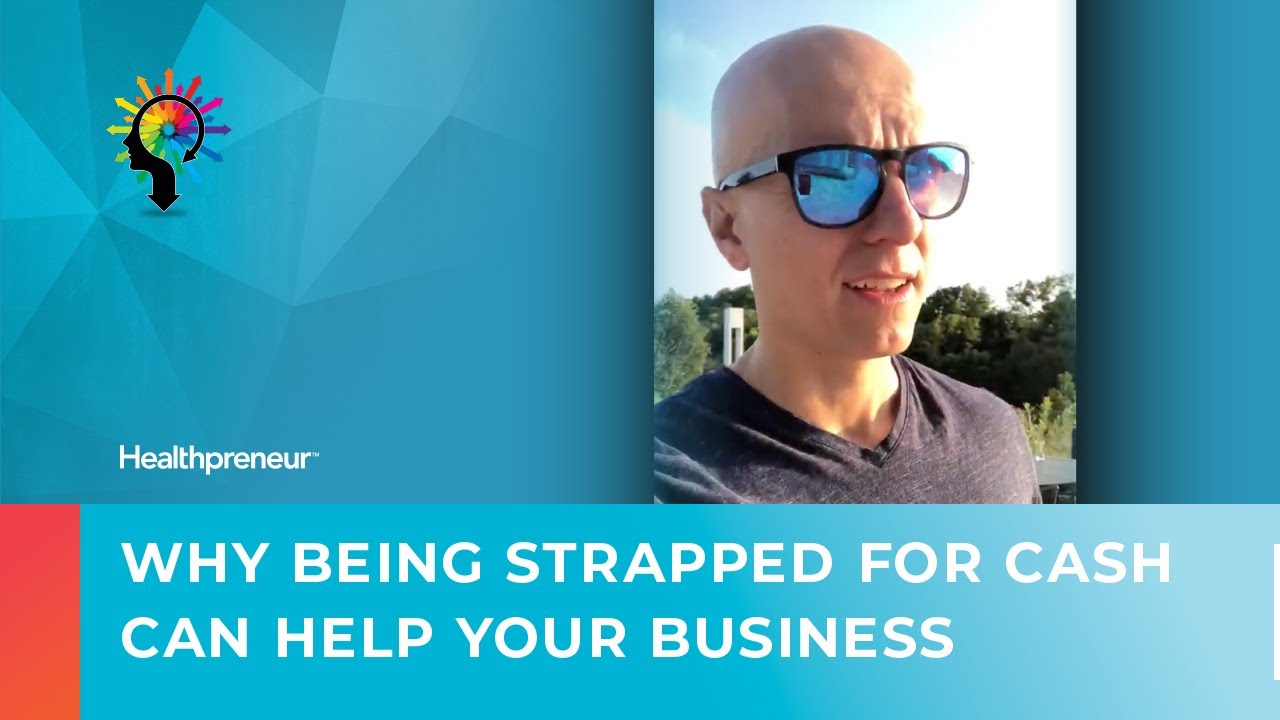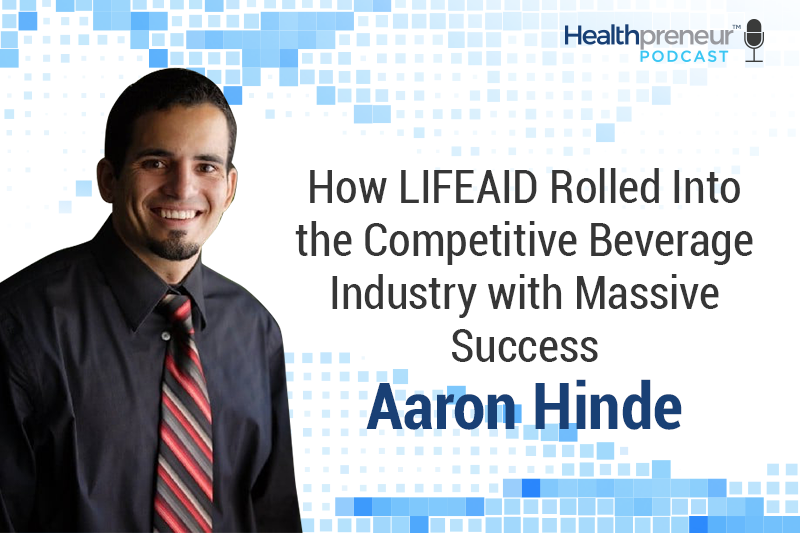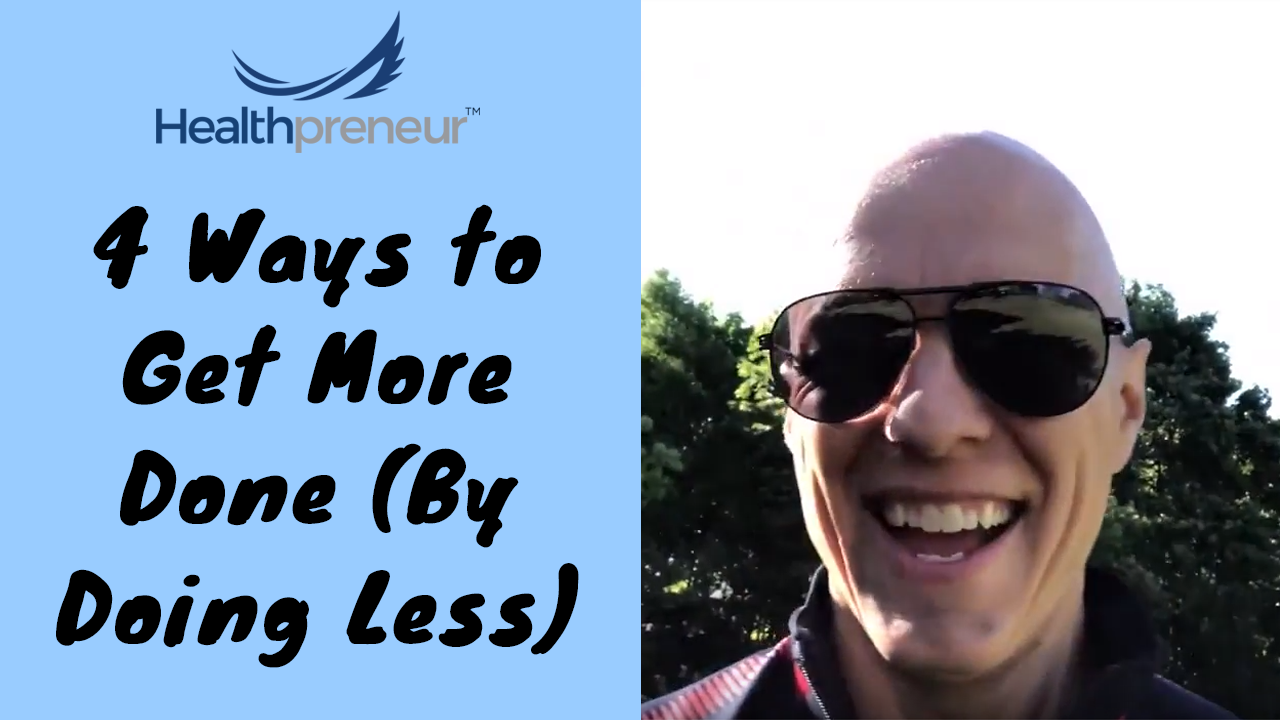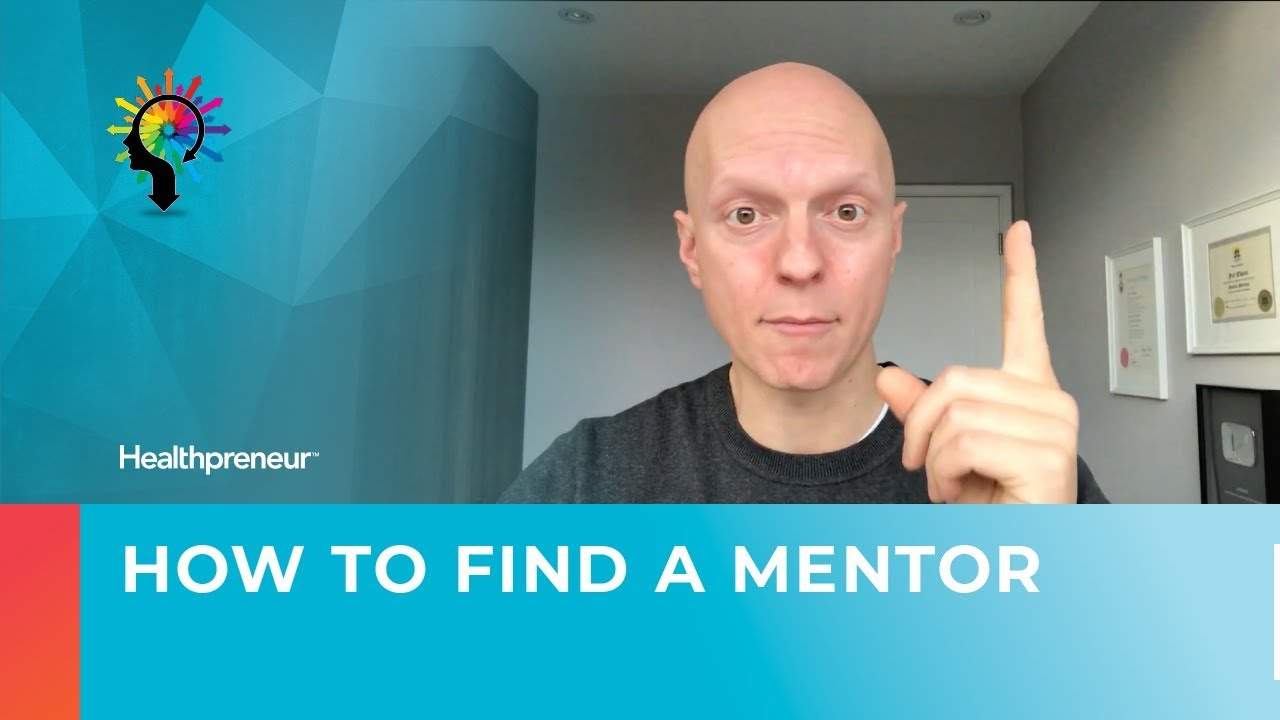3 Inspiring Lessons from the Titans Behind Precision Nutrition
In this episode, I want to share some really cool lessons. Three lessons specifically from my good friends, John Berardi and Phil Caravaggio.
If you don’t know them, they started probably one of the most prominent nutrition companies in the world called Precision Nutrition back in 2005 and their company recently got acquired.
There’s three lessons I learned from their journey that I share with you and see as a reflection with Healthpreneur.
In this episode you’ll discover the importance of differentiating yourself just by being yourself.
I’ve also gained an important insight as to why you don’t want to become a “cog in the wheel” as you build and scale your business by creating a company where the structure is built on giving everyone autonomy and authority.
And another important key is going all in on one thing which is the difference between those who succeed and those who fail. You need to have faith and not be looking for a safety net.
Tune in to find out how to make your business succeed from what I learned from the Titans behind Precision Nutrition.
In This Episode I discuss:
02:43 – 04:31 – Differentiating Yourself
04:31 – 08:56 – Create A Holocracy
08:56 – 13:21 – An Interesting Story Of Th e Universe Coming Together
13:21 – 16:34 – Taking Risks And Going All In
16:34 – 21:15 – Wrap Up With Yuri
Transcription
Hey guys, how’s it going? Yuri here and a special edition actually today. We are outside in the backyard, beautiful Day, sunny, maybe a little bit noisy in the back. There’s construction. They’re building some new condo way back there. So if you hear any background noise, that’s what’s going on, but in this special episode, I want to share some really cool lessons. Three lessons specifically from my good friends, John Berardi and Phil Caravaggio. They did a fireside chat last night with my good buddy Jason Gaignard who put this event on in Toronto and there’s probably about a hundred entrepreneurs in the room and he had Phil and JB, John Berardi speak about their journey. They actually recently got acquired.
Precision Nutrition got bought out for a lot of money, which is amazing . So Phil and John Berardi, if you don’t know them, they started probably one of the most prominent nutrition companies in the world called Precision Nutrition back in 2005. They shared their journey, never really having the intention to sell up until about two years ago and then they started getting phone calls, “Hey, we’re interested in buying your business. You know, let’s have a chat,” and so it was really interesting to see their transition from “I have expertise, I’m setting up a website. I’m just gonna share some stuff,” to building a pretty much a nine figure business over the space of 15 years. Incredible, incredible journey. I’ve known John and Phil now for almost close to a decade. Really, really great guys. Phil and I were in Strategic Coach together. Spent a lot of time together and it’s just, I’m so, so pumped for their evolution, for the transition.
Differentiating Yourself
So anyways, there’s three really important lessons I want to share it with you and I told this to both Phil and John and I said, “Listen, like you guys deserve all of this because Precision Nutrition as a company is an amazing representation of what a company should be.” Strong ethical moral values, never compromising integrity, providing the best possible value at every stage of the client process of the client journey and if you’ve ever done any business with Precision Nutrition, whether you’ve certified with them or used their Pro Coach software, you’ll know what I mean, they’re just top notch and I told them like, “Listen, your business is a reflection.” So here’s the first lesson. Your business is a reflection of you and the reason Precision Nutrition has such a great reputation in the industry is because Phil and John are great people.
They have big hearts, they’re genuine, they’re real and they just do good and as a result of that, that disseminates across their entire organization. So the beautiful thing about business is that business is really an extension of who you are and that’s the nice thing about not really having to worry about competition because the very fact that you are the owner of your business, you are the coach or the visionary, the leader. You bring a certain skill set, you bring a certain energy, you bring a certain perspective that no one else can bring to the marketplace. So even if you sold something that was almost identical to someone else, ultimately we don’t want to do that, but differentiating yourself just by being yourself is extremely powerful and that’s the first lesson is that your business becomes a reflection of you.
Create A Holocracy
The second thing and this is something that I don’t want to go too in depth on because it might be just a little bit too high level for where we’re at right now and quite frankly I don’t have enough knowledge around this. A lot of companies start off with a CEO at the top and then they have C-level executives underneath and then everyone underneath that and what John and Phil did was they adopted a new way of organizing a company. It’s a process, it’s a structure known as Holacracy where essentially everyone has autonomous responsibility and power to some degree based on in their own domain and the reason they did this is because, and this happens a lot, is that they were essentially two geniuses with a lot of helpers when they started their business and up until about 25 employees, it was them and then 25 people helping them out, right?
Always coming to them for the final say, the approval, et cetera and what John recognized was that he was spending more and more of his time not doing what he loved to do, but instead on phone calls and in meetings approving things and that is a very, very quick way to hate your business and so they adopted a philosophy that, they didn’t create this. Obviously it’s a different paradigm that someone else created and I don’t know the creators of it, but it’s called Holacracy and instead of it being top down, it’s really kind of just circular and spread out. So there’s no cog in the wheel. There’s no one person who’s more important than anyone else. Everyone has the expertise in their own domain. They have the authority and responsibility to do what they do, make decisions and obviously execute what they need to execute.
Now obviously for a very, very high level things, there’s obviously certain sign offs that need to happen from the owners of the CEO’s, but a lot of the success that Precision Nutrition was able to enjoy, Phil and John both said are a direct reflection, if you will, of that business model being very, very different than a top down where they would just say, “You do this. You do that. You do this and come back to me when that’s all done.” So it’s something that as Healthpreneur grows, that’s something I’m going to consider looking into as well and I think to be very honest with you, I think we actually do a very good job at creating a similar type of structure within our business, within our team.
Obviously I guess I am the leader, but I’ve always recognized that I don’t want to be the cog in the wheel. I don’t want to be the person who’s always coming to for approval for certain things. So part of my job and part of my awareness is how do I empower my team? How do I build leaders? How do I help them have more authority in specific areas? And I think we’ve done a really good job with that right now because right now as I’m recording this, we have Melanie and Nicole who are two of our copy coaches running a webinar Wednesday call. I have no involvement in that at all and they’re absolutely amazing at helping our clients with their webinars and that’s a process that I have no involvement in whatsoever and so part of what we’ve done with Healthpreneur and specifically with our health business accelerator workshop is draw various components of the business model we help you deploy: webinars, Facebook ads, enrollment calls, et cetera and I very quickly realized that I didn’t want to be the only coach servicing our clients in those different domains.
So I said, “Okay, who are experts in these areas? Let’s bring them into our team and let’s have them do the coaching and help our clients in those specific facets of their business,” and so what that’s allowed me to do is it’s freed up a lot of my time to do stuff like this, record videos and podcasts like this one, and it just allows me to do more of what I love to do instead of having to do coaching calls every single day of the week. So that’s the second thing is, what was the second thing? The second lesson there being, sorry, I can’t even remember. It was basically about the company structure giving everyone kind of autonomy and authority instead of micromanaging people.
An Interesting Story of The Universe Coming Together
So I think that’s the second big lesson and the third thing is that I think is really, really powerful to think about and I’ll share this in a story. So there’s a really good book that you should read. It’s called Principles by Ray Dalio. Ray Dalio is, if you’ve watched the show Billions, he’s kind of like the Bobby Axelrod, but probably in a nicer way of the world here. He runs the number one hedge fund in the world. He’s one of the top 10 most influential people alive and he has $180 billion under management I believe. So Phil is on the internet one night. Comes across something from Ray Dalio’s, goes down a bit of a rabbit hole and finds this word document. It was kind of like a memo that Ray had written to his team.
He was immediately blown away by his ability to simplify complexity, to take these concepts of the economy and all that kind of stuff and really just simplify it so that anyone could understand it and then he thought to himself, so he read the first three paragraphs and he said, “This is the best thing I’ve ever read in my life,” and then he felt bad because this memo, which was several pages long, was kind of just out there in the ether is not really being read by anyone. It was almost like one of those documents that you put up on your server and then it shows up in Google. That’s kind of what it was. So what Phil decided to do was he took this manifesto or this memo or there’s a longer version of it and he decided of his own volition and this is actually written about in the book okay? So I’m not just spoiling the surprise.
He doesn’t know Ray. Ray doesn’t know him. He takes this word document essentially and he says to himself, “This deserves to be put into some type of legacy piece. This really should be shown to more people.” So he hires his own designer, his own book designer, who by the way did the book for Jay Z and some other very, very big people, not cheap. So he spent a lot of money of his own money, his own time, took eight months for them to put this book together. Doesn’t tell anyone about it, just kind of doing this thing and this is the way Phil is. He’s just like, he’s unbelievable.
Gets the book done after eight months and a lot of money spent and then he’s thinking to himself, “Well, I don’t know Ray. Ray doesn’t know me. How am I going to get this to him?” and so then he remembered that there was an individual who applied for a job at PN who didn’t get the job, but through the grapevine, he found out that a story Phil found this individual had contacts at Ray Dalio’s office and so he took a chance, gave this individual a book and through the grapevine, hopefully it would make its way to Ray. Now that’s a lot of faith, right? You’ve put a lot of money into a book, a lot of time into a boo, and now you’ve given it to some random person and you don’t even know if the book is going to get to the ultimate destination or using the post service. The postal service is bad enough, right?
Six months go by and Phil is in Italy with his wife. He’s thinking to himself, “The book probably just disappeared, went into the garbage or the guy took it. Who knows? We’ll figure out a different way to get through.” Then he gets a phone call. He gets a phone call and the guy on the phone is like, “Is this Phil?” and Phil’s like, “Yeah.” He’s like, “This is Ray Dalio.” Ray Dalio calls him up, he got the book. He was so blown away by the fact that a stranger who’s never even met him would go to this length to create such a masterpiece and give it to him. So what does Ray Dalio do? Flies his private jet, picks him up in Italy, flies him and his wife back to their place in Connecticut, spends a couple of days together. They build this amazing friendship.
Now, Phil did not do this with any ulterior motive. This is the way he is and the interesting thing was Ray’s asking, “Well, why did you do this? What do you want?” and Phil says like, “Honestly nothing. I just felt that this was an amazing piece that needed to be seen by more people and honestly like if you could coach me in some areas that I’m not that strong in, at some point in the future that’d be awesome.” Fast forward a little while later when Phil and John are considering selling the company. Now he’s able to turn to Ray to get some really great perspective and advice he never would have had otherwise.
Taking Risks And Going All In
That book went on to become a number one New York Times bestseller and that never would have happened had Phil not taken the emphasis upon himself and really put all his chips in to make this happen. So here’s the third lesson is that sometimes there are things you need to do where you have to put all of your chips into the table and what Phil did was an example of a potential loss. He could have lost all his money and eight months’ worth of time in addition to his real job, right? This is kind of a side project that was taking up a lot of his time and mental energy as well. That was a massive undertaking, a massive risk, but he knew at some level that this was the right thing to do and he had to go all in and that’s what he did and this is a really, really important lesson.
This is one of the reasons why Phil and John are able to cash out for a hundreds of millions of dollars with Precision Nutrition because they’re the type of people who go above and beyond. They provide incredible value for their community, but in opportunities and circumstances like that, what I just described, they go all in and I want you to think about you and your circumstances right now because the reality is that if you don’t go all in on one thing, you’re never going to be committed to anything and you’re dabbling a little bit here and there and there and there and this is the number one reason why most entrepreneurs don’t succeed in business. They don’t have enough faith in themselves or in the process to go all in and so they’re always looking for the exit. They’re always looking for the safety net.
They’re always looking for the guarantee. Show me the proof that this is going to work. Did Phil have proof that what he did was going to work? Not at all. No one had ever done that before. Do you have proof that what you’re going to embark on is going to work? Not at all. Do you have proof that if you work with us, it’s going to work out for you? Maybe, maybe not, but your results have nothing to do with our other client’s results, just as there is no certainty in working with us, there’s also no certainty in working with anyone else or even on your own. Because what it comes down to is you and your ability to go all in and make things happen no matter what and that is really important to understand that your results are always going to be your responsibility, no one else’s and yes, there are systems and strategies that are maybe a bit smarter and more effective than others.
But even at the end of the day, you could use a mediocre system, a mediocre strategy, but if you’re the type of person who will do no matter what and do whatever it takes to make something work, you will make it work. So I want you to really think about this and don’t blame this stuff. Don’t blame things outside of yourself. Look in the mirror because that’s really where the finger needs to be pointed and in a good way as well as a bad way. If things don’t work out. Hey, whose fault is it? It’s your fault. If things do work out, whose fault is it? It’s your fault. I mean you’re responsible, good or bad for what happens. Okay? So those are the three lessons.
Wrap Up With Yuri
Hope you get some insight from those and if you ever have the chance to do any business with Precision Nutrition, you have my full blessing. They’re amazing. I would highly recommend them for any kind of certifications you’re thinking of doing if you want to use their Pro Coach platform. I personally haven’t used it, but I remember being behind the scenes as Phil was kind of talking me through what they were building years ago and I told them, “Dude, this is going to revolutionize the coaching industry.” So anyways, they’re incredible. I just wanted to share that story with you and one final thing is that this is another example why it’s important for you to be plugged into communities of entrepreneurs where you are learning from people who have succeeded and failed and what the lessons they’ve learned along the way are. Because part of hiring a coach or a mentor or even just learning from people who’ve walked the walk is understanding what went well, what didn’t and learning from their mistakes, their pitfalls et cetera.
If you can put yourself in environments like that, whether it’s masterminds or live events where you’re connecting with these people and hearing these stories and getting to meet them personally to really build those connections and relationships, it’s arguably one of the most important things you can do for your business and if you know my story, the big shift in my life, my business happened in 2009 where I decided after three years of doing things all by myself, I said to myself, “Listen, dude, come out from under the rock and really connect with some people. Go to some events, even if you don’t have the money, get there because that’s the only way you’re going to grow. That’s the only way you’re going to grow,” and 2010 was the beginning of all that. I went to four live events, met my initial coach, met some amazing people in our space and that was the inflection point in my business.
Everything that I have, everything that I’ve experienced everywhere I am today is only a byproduct of that initial decision and I really feel bad. Listen, like I understand everyone’s in a different position, financial leader situationally, but listen, it upsets me when you know someone’s interested, for instance in coming out to our big event in Scottsdale or our Mastermind in Toronto and they’re like, “Oh, like if you only lived closer or if the event was only closer,” and I’m like, “Well where do you live?” and they’re like, “Chicago.” I’m like, “Do you not have access to an airport? Like it’s this thing that flies in the sky and it takes you to another destination within one to three hours. You don’t have access to that?” So listen, where there’s a will there’s a way. That’s all it comes down to.
If you want it bad enough, you will find a way. You will jump on a train if you have to, but to say that flying to Toronto from Chicago is a little bit too far. I’d have to pay for a flight and cross the border. That’s a real big limitation that’s going to hold you back in business and in life. So anyways, with that, I will finish this episode off.
I hope this makes sense. I hope this story inspires you, but most importantly the thing that I want you to really think about here is you have to have faith in yourself and you have to go all in, not halfway, all in. Will it fail? Maybe. Will it succeed? Maybe as well, but you’ll never know unless you try it and I can promise you that the upside is infinitely greater than the downside. All right guys, thanks for tuning in. Hope you’ve enjoyed this episode. I look forward to seeing you in the next one. Ciao for now.
If you enjoyed this episode, head on over to iTunes and subscribe to Healthpreneur™ Podcast if you haven’t done so already.
While you’re there, leave a rating and review. It really helps us out to reach more people because that is what we’re here to do.
What You Missed
In our last episode, we had one of our rockstar inspiring clients, Jenn Edden as our guest, and I couldn’t have been more pumped because she has been an absolute inspiration for so many other clients that we serve.
Jenn has been a health practitioner for about 15 years and she specializes in helping busy entrepreneurial women learn how to dial in their sweet tooth without all the dieting and deprivation.
Like so many in this space, she had dabbled in a little bit of everything to get her message out only to find herself burnt out. Jenn struggled for 15 years and in just 4 months, built her dream business.
For Jenn, having a business that is streamlined has been the missing piece to taking her business to the next level.
Related posts
March 23, 2018
How LIFEAID Rolled Into the Competitive Beverage Industry with Massive Success with Aaron Hinde
Today we’re on the 74th episode…





